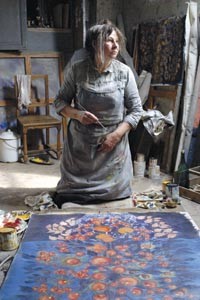Martin Provost's Séraphine tells a story at once familiar and curious. Its protagonist is a not-quite-starving artist in provincial France on the eve of World War I. Countless narratives have led us to expect that such talented painters -- contemporaries of Picasso -- will struggle for recognition, only to watch hopes fade beneath the gaze of an uncaring public. And then comes the dissolution, perhaps into madness.
Séraphine's true story is that and more. Séraphine Louis, after all, was a woman when women artists were especially ignored. She was a humble and even childlike domestic, impoverished from birth and formally educated in nothing, least of all art. And in an era of dawning rationalism, bureaucracy and mechanization, religion falling from favor, Séraphine credited her talent to brushes with the divine.
Provost's poignant, beautifully filmed bio-pic (winner of seven Cesars, the French Academy Award) is built around the contrasts in the painter's life. We meet Séraphine (Yolande Moreau) in the medieval town of Senlis. She's a heavy-footed woman, bedraggled, no longer young. At night she might be found in the cathedral -- or perhaps, mysteriously, wading in a pond. By day she scrubs floors, hand-launders shirts -- and steals away to meadows and groves whose sun-lit majesty shames the dingy halls and galleys where she earns her bread.
But the humbleness of her life is the flip side of a deeper passion. Kneeling in church, she pours melted candlewax into stoppered bottles. In kitchens, she scoops thick calves' blood from basins. It's all mixed with the white paint she foregoes rent payments to buy. And by night, beneath a home-made shrine to the Virgin Mary, she crafts -- sometimes using her fingers as brushes -- visionary paintings of flowers and fruit, vibrantly colorful celebrations of life no one, it seems, ever sees.
Today we'd celebrate Séraphine as an "outsider artist." In 1914, though, recognition of her talent occurs through a chance association with Wilhelm Uhde (Ulrich Tukur), a German expatriate critic and art dealer. Uhde classifies work like Séraphine's as "modern primitive." The catch is that while he admires her paintings before the war, he flees before the boots of his invading countrymen. For Séraphine, material rewards don't come until a decade hence -- and she barely has time to enjoy these fruits before the angel who guides her gives way to what we'd now call psychosis.
Provost co-wrote the script with Marc Abdelnour, and his film is implicitly if subtly political. He has a bitter chuckle at the expense of the cultured philistines who employ Séraphine but can't imagine her making anything as rarefied as Art. But otherwise, Provost doesn't deconstruct the obstacles facing her so much as dramatize how -- quietly, boldly, naively -- she surmounts them. (It's against all protocol, for instance, that she befriends Uhde, who's both male and upper-class.)
Moreau's portrayal of Séraphine is both canny and uncanny. The artist is simple, but with untapped depths. Or perhaps it's her simplicity that gives her depth, as suggested in a brief exchange about spirituality with Uhde. The educated man says he believes in the human soul, because humans can be sad. Séraphine replies that animals, too, get sad. Remarking on her own inspiration, she quotes the Catholic mystic St. Teresa of Avila: "Be ardent in your work, and you will find God in your cooking pots."
At first glance, Séraphine's downfall seems inextricably linked with that very simplicity. Even when she starts earning a steady income in the late 1920s, her canvases grow increasingly abstracted -- ecstatically, and even terrifyingly, alive. In scenes Provost and Moreau craft with passion and restraint, Séraphine becomes a born-again spendthrift, answerable only to visions, and ends without even her art for solace. As the asylum attendant reports, "She says the painting has left in the night." In French, with subtitles.

Starts Fri., July 31. Regent Square














